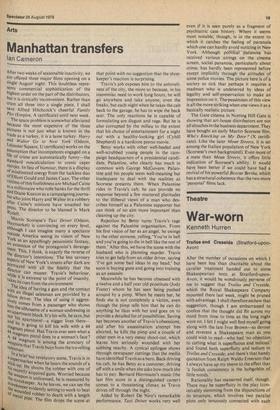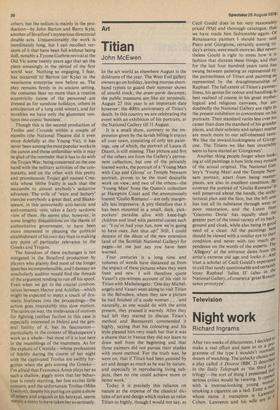Theatre
War-worn
Kenneth Hurren Troilus and Cressida (Stratford-uponAvon)
After the number of occasions on which I have been less than charitable about the cavalier treatment handed out to some Shakespearian texts at Stratford-uponAvon, it would be wondrously perverse of me to suggest that Troilus and Cressida, which the Royal Shakespeare Company mounted there last week, might be pruned with advantage. I shall therefore eschew that suggestion, though I am embarrassed to confess that the thought did flit across my mind from time to time as the long night wore on. I felt I might well find myself going along with the late Ivor Brown—as devout and reverent a Shakespeare man as you could wish to read—who had 'no objection to cutting what is superfluous and tedious' and found both superfluity and tedium in Troilus and Cressida; and there's that handy quotation from Ralph Waldo Emerson that I always have up my sleeve to the effect that 'a foolish consistency is the hobgoblin of little minds.'
Rationality has reasserted itself, though. There may be superfluity in the play (conceivably stemming from the disjunctions of its structure, which involves two parallel plots only tenuously connected with each other), but the tedium is mainly in the production—by John Barton and Barry Kyle, another of Stratford's mysterious directorial double acts. Unquestionably the work is inordinately long, but I can recollect versions of it that have been full without being dull, notably a Tyrone Guthrie revival at the Old Vic some twenty years ago that set the piece amusingly in the period of the first world war. Nothing so engaging. I fear, has occurred to Barton (or Kyle) in the wearisome enterprise now before us. The play remains firmly in its ancient setting, the costumes bear no more than a routine eccentricity (some of the personnel are dressed as for sunshine holidays, others in anticipation of a long cold winter), and for novelties we have only the glummest ventures into comic 'business'.
Though this is the second production of Troilus and Cressida within a couple of months (the National Theatre did it even more dolefully at the Young Vic), it has never been among the most popular works in the canon and those unfamiliar with it may be glad of the reminder that it has to do with the Trojan War, being concerned on the one hand with the military activities of the contestants, and on the other with this pretty and promiscuous Trojan girl named Cressida whose blithe frailty is such that she succumbs to almost anybody's seductive advances. The evils of 'wars and lechery' exercise everybody a great deal, and Shakespeare, in this unwontedly anti-heroic and anti-romantic vein, takes a fairly sardonic view of them. He seems also, however, in some lengthy disquisitions on the theme of authoritative government, to have been more interested in pleasing the political establishment of his own day than in making any point of particular relevance to the Greeks and Trojans.
The boredom of these exchanges is not mitigated in the Stratford production by players who plainly find most of the longer, speeches incomprehensible, and I daresay an unscholarly auditor would find the threads of the argument tending to run off his spool. Even when we get to the crucial confrontation between Hector and Achilles—which might be expected to inject a touch of dramatic liveliness into the proceedings—the action goes inscrutably into slow motion. The satire on war, the irrelevance of motives for fighting (neither faction in this case is especially interested in Helen) and the general futility of it. has its fascination— particularly in the context of Shakespeare's work as a whole—but most of it is lost here in the mumblings of the mummers. As for the exploits of Cressida—whose professions of fidelity during the course of her night with the captivated Troilus are swiftly forgotten when she gets among the Greeks— I'm afraid that Francesca Annis plays her as such a shallow, giggly minx that her behaviour is rarely startling, her fate excites little concern, and the unfortunate Troilus (Mike Gwilym), despite his putting on quite a show of misery and anguish in his betrayal, seems merely a ninny to have taken her so seriously.



























 Previous page
Previous page